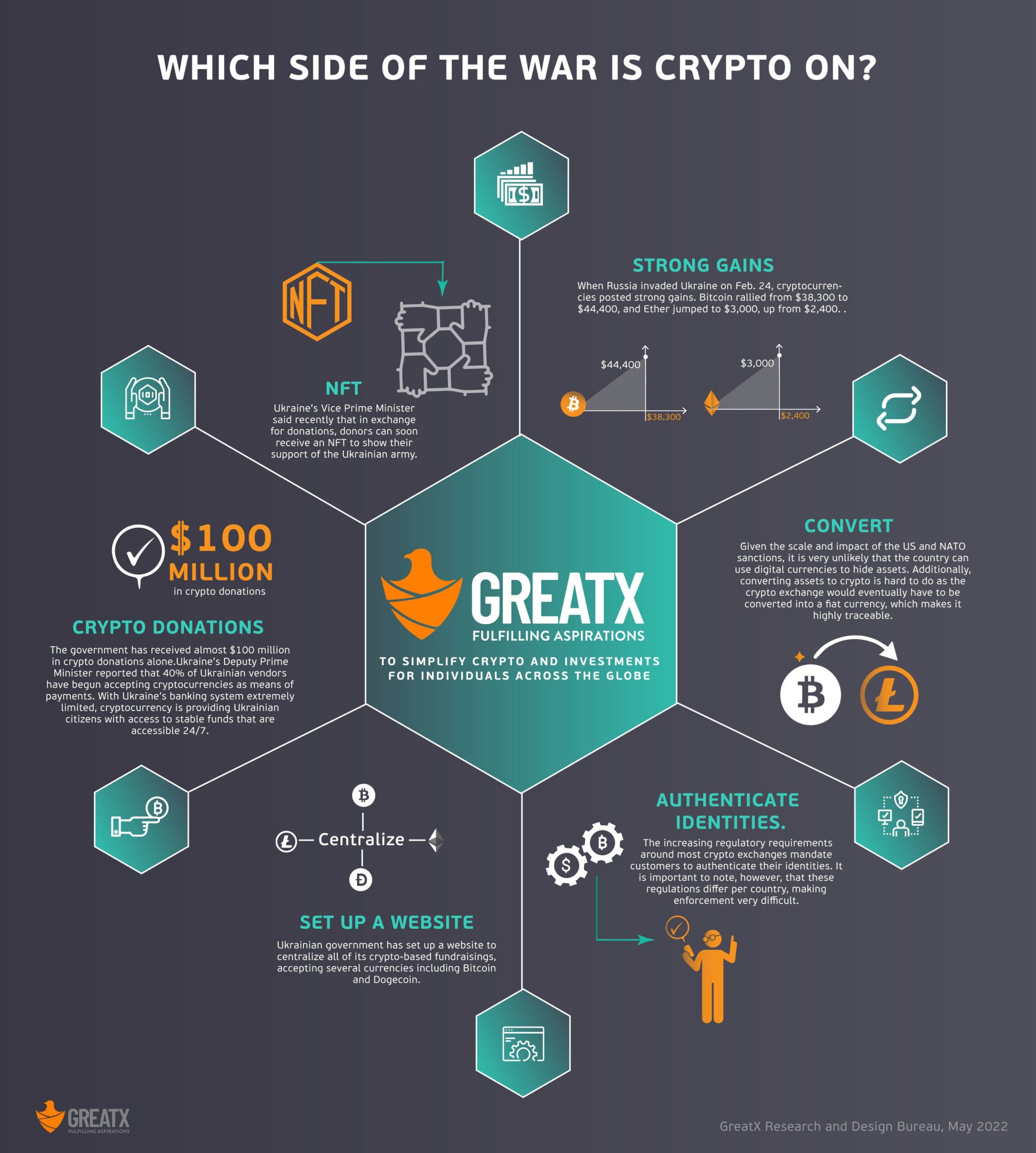- Location: USA
Russia’s invasion of Ukraine has brought a lot of attention to the cryptocurrency industry, with many of the aspects of blockchain technology being put to the test. Mykhailo Fedorov, Ukraine’s deputy prime minister, recently asked major crypto exchanges to block the addresses of Russian users. The Biden administration then considered sanctioning Russian cryptocurrency assets and limiting certain Russian individuals and groups from using crypto exchange services.
However, Russia’s cryptocurrency activity is currently much lower than it has been in the last two years. According to Chain analysis, Russian Ruble-denominated crypto activity was under $35 Million on March 3, indicating a relatively low number of crypto transactions occurring at the onset of the invasion.



When Russia invaded Ukraine on Feb. 24, cryptocurrencies posted strong gains. Bitcoin rallied from $38,300 to $44,400, and Ether jumped to $3,000, up from $2,400.
There are several reasons why cryptocurrency has not taken off in Russia in the way many had expected. The country’s cryptocurrency ecosystem is not very well built out, as the country was initially slow to adopt digital currencies. Given the scale and impact of the US and NATO sanctions, it is very unlikely that the country can use digital currencies to hide assets. Additionally, converting assets to crypto is hard to do as the crypto exchange would eventually have to be converted into a fiat currency, which makes it highly traceable.
Even before the invasion, the United States government was worried that cryptocurrencies could be used as a medium to dull the impact of economic sanctions. However, there is very little evidence that this type of activity has come to fruition. It seems that most cryptocurrency trading platforms are connected to governments, which disregard the fully decentralized nature of cryptocurrencies themselves. The increasing regulatory requirements around most crypto exchanges mandate customers to authenticate their identities. It is important to note, however, that these regulations differ per country, making enforcement very difficult. In addition, as identified by the Economist, cryptocurrency transactions are not as private as traditionally thought; once anonymous wallets are linked to their holders, it is very easy to trace transactions including illegal ones.
On the other side of the conflict, the Ukrainian government has set up a website to centralize all of its crypto-based fundraisings, accepting several currencies including Bitcoin and Dogecoin. The government has received almost $100 million in crypto donations alone. Since Ukraine cannot buy all of its needed supplies using cryptocurrency, the government has had to convert a majority of these donations back to fiat currency; however, Ukraine’s Deputy Prime Minister reported that 40% of Ukrainian vendors have begun accepting cryptocurrencies as means of payments. With Ukraine’s banking system extremely limited, cryptocurrency is providing Ukrainian citizens with access to stable funds that are accessible 24/7.
Ukraine’s Vice Prime Minister said recently that in exchange for donations, donors can soon receive an NFT to show their support of the Ukrainian army.
GreatX is here to simplify crypto and investments for individuals across the globe. With a leadership team that holds a collective experience of 250 years, GreatX is your destination for all things digital investments related.
Disclaimer
This commentary is provided as general information only and is in no way intended as investment advice, investment research, a research report or a recommendation. Any decision to invest or take any other action with respect to the securities discussed in this commentary may involve risks not discussed herein and such decisions should not be based solely on the information contained in this document.
Statements in this communication may include forward-looking information and/or may be based on various assumptions. The forward-looking statements and other views or opinions expressed herein are made as of the date of this publication. Actual future results or occurrences may differ significantly from those anticipated and there is no guarantee that any particular outcome will come to pass. The statements made herein are subject to change at any time. GreatX disclaims any obligation to update or revise any statements or views expressed herein.
In considering any performance information included in this commentary, it should be noted that past performance is not a guarantee of future results and there can be no assurance that future results will be realized. Some or all of the information provided herein may be or be based on statements of opinion. In addition, certain information provided herein may be based on third-party sources, which information, although believed to be accurate, has not been independently verified. GreatX and/or certain of its affiliates and/or clients hold and may, in the future, hold a financial interest in securities that are the same as or substantially similar to the securities discussed in this commentary. No claims are made as to the profitability of such financial interests, now, in the past or in the future and GreatX and/or its clients may sell such financial interests at any time. The information provided herein is not intended to be, nor should it be construed as an offer to sell or a solicitation of any offer to buy any securities. This commentary has not been reviewed or approved by any regulatory authority and has been prepared without regard to the individual financial circumstances or objectives of persons who may receive it. The appropriateness of a particular investment or strategy will depend on an investor’s individual circumstances and objectives.
However, Russia’s cryptocurrency activity is currently much lower than it has been in the last two years. According to Chain analysis, Russian Ruble-denominated crypto activity was under $35 Million on March 3, indicating a relatively low number of crypto transactions occurring at the onset of the invasion.



When Russia invaded Ukraine on Feb. 24, cryptocurrencies posted strong gains. Bitcoin rallied from $38,300 to $44,400, and Ether jumped to $3,000, up from $2,400.
There are several reasons why cryptocurrency has not taken off in Russia in the way many had expected. The country’s cryptocurrency ecosystem is not very well built out, as the country was initially slow to adopt digital currencies. Given the scale and impact of the US and NATO sanctions, it is very unlikely that the country can use digital currencies to hide assets. Additionally, converting assets to crypto is hard to do as the crypto exchange would eventually have to be converted into a fiat currency, which makes it highly traceable.
Even before the invasion, the United States government was worried that cryptocurrencies could be used as a medium to dull the impact of economic sanctions. However, there is very little evidence that this type of activity has come to fruition. It seems that most cryptocurrency trading platforms are connected to governments, which disregard the fully decentralized nature of cryptocurrencies themselves. The increasing regulatory requirements around most crypto exchanges mandate customers to authenticate their identities. It is important to note, however, that these regulations differ per country, making enforcement very difficult. In addition, as identified by the Economist, cryptocurrency transactions are not as private as traditionally thought; once anonymous wallets are linked to their holders, it is very easy to trace transactions including illegal ones.
On the other side of the conflict, the Ukrainian government has set up a website to centralize all of its crypto-based fundraisings, accepting several currencies including Bitcoin and Dogecoin. The government has received almost $100 million in crypto donations alone. Since Ukraine cannot buy all of its needed supplies using cryptocurrency, the government has had to convert a majority of these donations back to fiat currency; however, Ukraine’s Deputy Prime Minister reported that 40% of Ukrainian vendors have begun accepting cryptocurrencies as means of payments. With Ukraine’s banking system extremely limited, cryptocurrency is providing Ukrainian citizens with access to stable funds that are accessible 24/7.
Ukraine’s Vice Prime Minister said recently that in exchange for donations, donors can soon receive an NFT to show their support of the Ukrainian army.
GreatX is here to simplify crypto and investments for individuals across the globe. With a leadership team that holds a collective experience of 250 years, GreatX is your destination for all things digital investments related.
Disclaimer
This commentary is provided as general information only and is in no way intended as investment advice, investment research, a research report or a recommendation. Any decision to invest or take any other action with respect to the securities discussed in this commentary may involve risks not discussed herein and such decisions should not be based solely on the information contained in this document.
Statements in this communication may include forward-looking information and/or may be based on various assumptions. The forward-looking statements and other views or opinions expressed herein are made as of the date of this publication. Actual future results or occurrences may differ significantly from those anticipated and there is no guarantee that any particular outcome will come to pass. The statements made herein are subject to change at any time. GreatX disclaims any obligation to update or revise any statements or views expressed herein.
In considering any performance information included in this commentary, it should be noted that past performance is not a guarantee of future results and there can be no assurance that future results will be realized. Some or all of the information provided herein may be or be based on statements of opinion. In addition, certain information provided herein may be based on third-party sources, which information, although believed to be accurate, has not been independently verified. GreatX and/or certain of its affiliates and/or clients hold and may, in the future, hold a financial interest in securities that are the same as or substantially similar to the securities discussed in this commentary. No claims are made as to the profitability of such financial interests, now, in the past or in the future and GreatX and/or its clients may sell such financial interests at any time. The information provided herein is not intended to be, nor should it be construed as an offer to sell or a solicitation of any offer to buy any securities. This commentary has not been reviewed or approved by any regulatory authority and has been prepared without regard to the individual financial circumstances or objectives of persons who may receive it. The appropriateness of a particular investment or strategy will depend on an investor’s individual circumstances and objectives.
About the Author



Annelise Osborne
Co-Founder
Women of Influence (Innovation) winner Annelise is the co-founder of GreatX with prestigious accolades to her name. Annelise has 25+ years of experience in the capital market and has in the past managed portfolios as large as $400B.
About the Company
Join us and experience a better way of owning long-term return-yielding assets in the U.S.
GreatX belongs to the family of GreatOne


